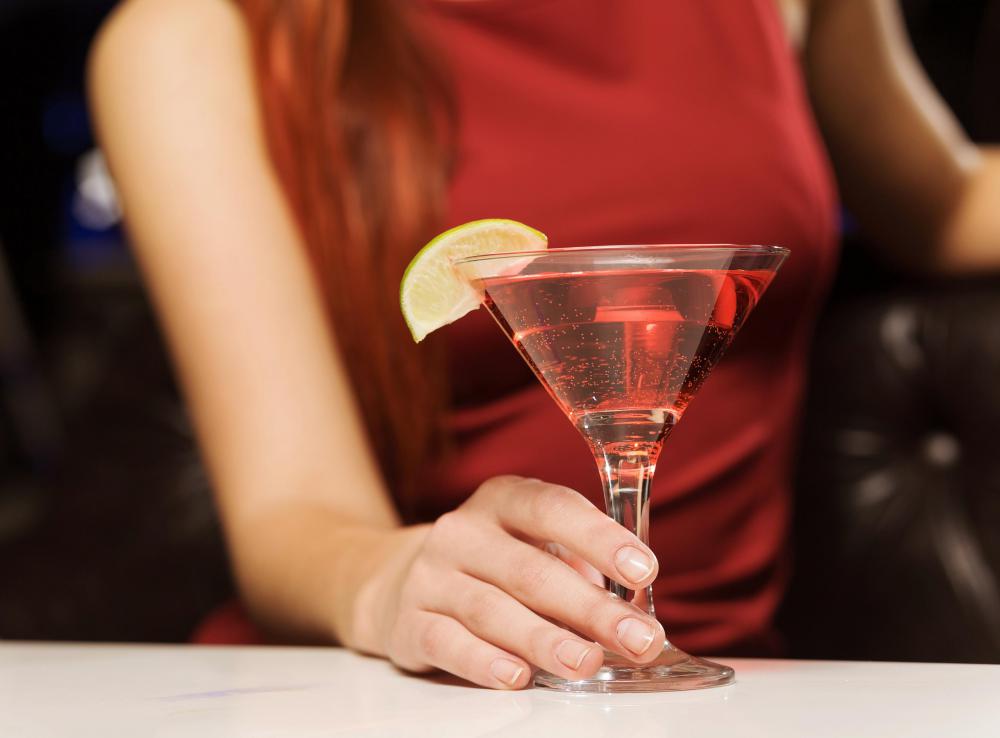At WiseGEEK, we're committed to delivering accurate, trustworthy information. Our expert-authored content is rigorously fact-checked and sourced from credible authorities. Discover how we uphold the highest standards in providing you with reliable knowledge.
What Are the Risks of Combining Lorazepam and Alcohol?
Lorazepam and alcohol are dangerous in combination. These drugs have similarities in action, which means they can increase the effects of each other, translating to symptoms like greater intoxication, sleepiness, dizziness, or suppression of breathing. Using large amounts of both is exceptionally risky and can cause death. Frequent alcohol use also interferes with how well lorazepam works over the long term.
The least effect of combining minimal amounts of lorazepam and alcohol is increased intoxication. In other words, people are likely to feel more symptoms of drunkenness with lesser amounts of alcohol. This could affect motor skills, hand eye coordination, clarity of speech, and judgment. Even in very small increments, lorazepam and alcohol could impair skills enough to make driving very dangerous. Alternately, the two can combine together to initially promote sleep, which may lead to premature waking at night.

One of the greatest concerns in mixing lorazepam and alcohol is that both drugs are central nervous system depressants and they impact the rate of breathing. In worst case scenarios, people who combine the two in large amounts may be prone to sleep apnea or stop-breathing episodes. As breathing speed slows, it may stop altogether. The person may be too sedated to wake up enough to reinitiate breathing. In these instances, death can occur.

Patients often use lorazepam to treat anxiety conditions like post-traumatic stress, generalized anxiety disorder, and panic disorder. Medical literature suggests that combining lorazepam and alcohol when a patient has an anxiety disorder creates additional problems. Alcohol may cause lorazepam to work less effectively, and over time if the two are used together, it may result in greater anxiety and irritability that cannot be controlled with medication any longer. This means a patient using both substances could end up worsening his or her condition.

Nevertheless, dual use of lorazepam and alcohol is quite common among people with anxiety disorders. Initially, when these drugs are used together they may promote more relaxation because they are causing a greater level of intoxication. A patient may feel better and more dissociated from anxiety feelings.
This feeling tends to deteriorate over time. As a result, patients might end up using more of one or both substances, increasing the danger of higher levels of intoxication and fatal stop-breathing episodes. This measure also raises the likelihood of becoming addicted to either of these substances. Increased use typically elevates anxiety and creates mood instability.

When patients start using a benzodiazepine like lorazepam, they should talk to their physicians about their alcohol use. Doctors may consider other anti-anxiety medicines that don't have this central nervous system depressant feature. Alternately, patients and doctors might evaluate if alcohol use has become a problem, and patients could get medical support if they plan to abstain. Ironically, lorazepam is frequently used to promote comfort during alcohol detox, which attests to the two drugs' similarity.
AS FEATURED ON:
AS FEATURED ON:















Discussion Comments
I tried to commit suicide in January by taking 60mg of lorazepam, drinking a bottle of wine, and taking a few promethazine so I wouldn't vomit. The next day a former friend called the cops for a welfare check because he couldn't reach me on the phone and I woke up in the hospital, pissed off that I was still alive.
I have no recollection of the three days (the day I took everything and two days in the hospital). I want to know why didn't I die? I researched beforehand and 60 mg should have been more than enough to do the job.
@ddljohn-- Please talk to a doctor about this. The article has already mentioned that it is very dangerous to mix these types of medications and alcohol. If you are doing it willingly, then I think that you might be suicidal and you should speak to a professional for help. Just because nothing very bad happened last time does not mean that you are going to be lucky the next time. And I'm not just talking about the risk of dying, but also the severe side effects that you may experience for days or even longer.
I'm sure that combining lorazepam and alcohol also poses a danger to your internal organs, particularly your liver and kidneys. Alcohol is a toxin. The body treats it that way and the kidneys and liver get to work immediately to flush it out of the system. If these organs are also forced to deal with medications at the same time, their functions may be affected. If high doses of the drug are taken, you may even experience kidney or liver failure.
Even if you don't experience such issues, you may injure yourself or have an accident due to the drowsiness and lapse of judgment caused by the mixture. When I was in college, there was a guy who drank while he was on a prescription antidepressant. He was so drowsy and out of it that he fell into the campus lake and drowned. They found his body three days later.
I combined lorazepam and alcohol once. Nothing happened. I just felt tired and slept a lot.
Lorazepam is a fairly strong drug. It is used to treat severe anxiety and sometimes depression and panic. If someone is on this drug, it's safe to assume that he or she has anxiety levels that are detrimental and get in the way of day to day functioning.
Alcohol is a depressant. It causes side effects like drowsiness and sedation, but it can also cause anxiety and depression. Does it make sense for someone with severe anxiety to drink alcohol then? I don't think so. Drinking alcohol while taking lorazepam does not make sense. I think it's a foolish decision and also very dangerous.
I'm against combining alcohol wit any medication. There is no way we can know how the two substances will react to one another in an individual.
Post your comments